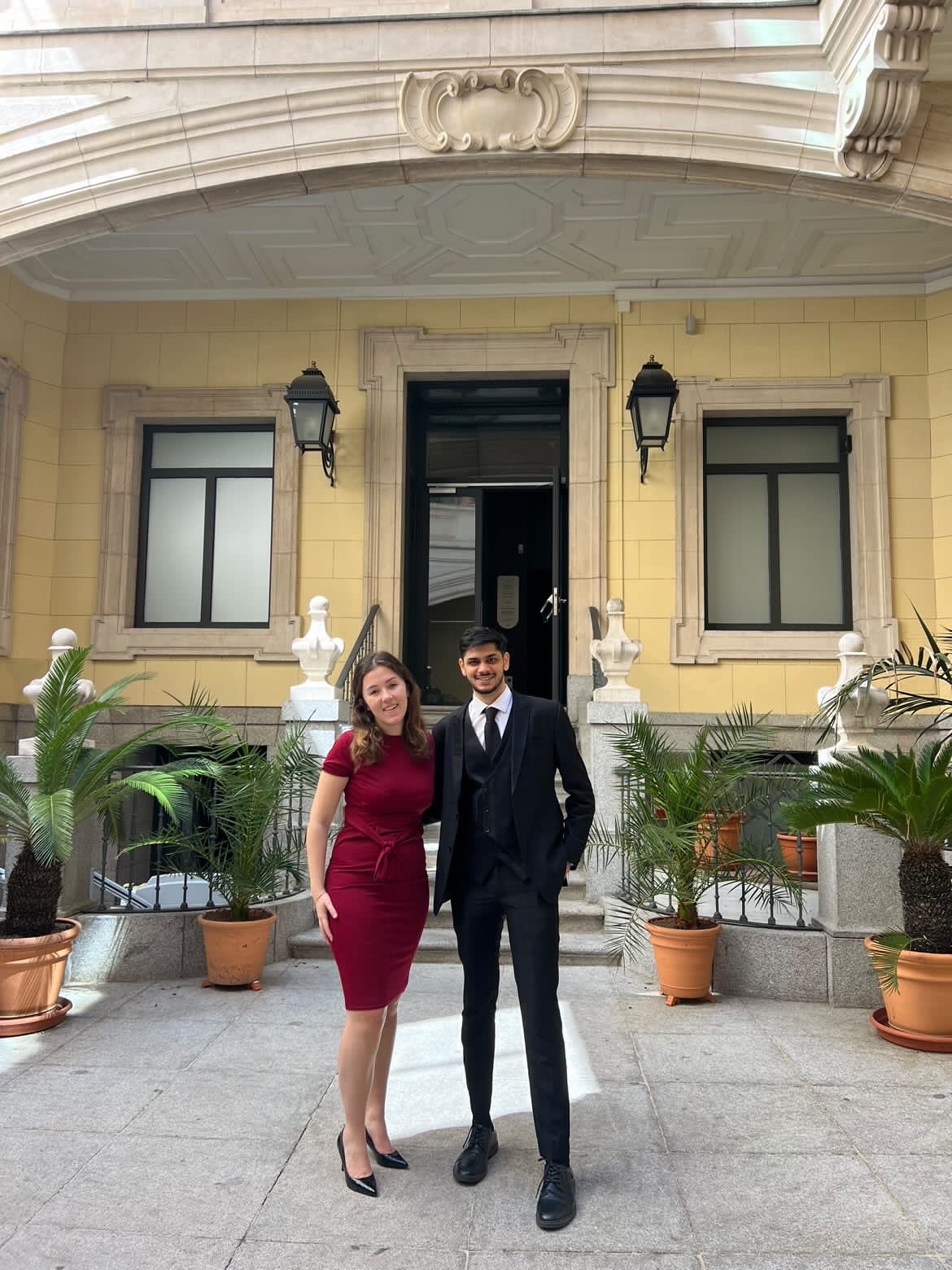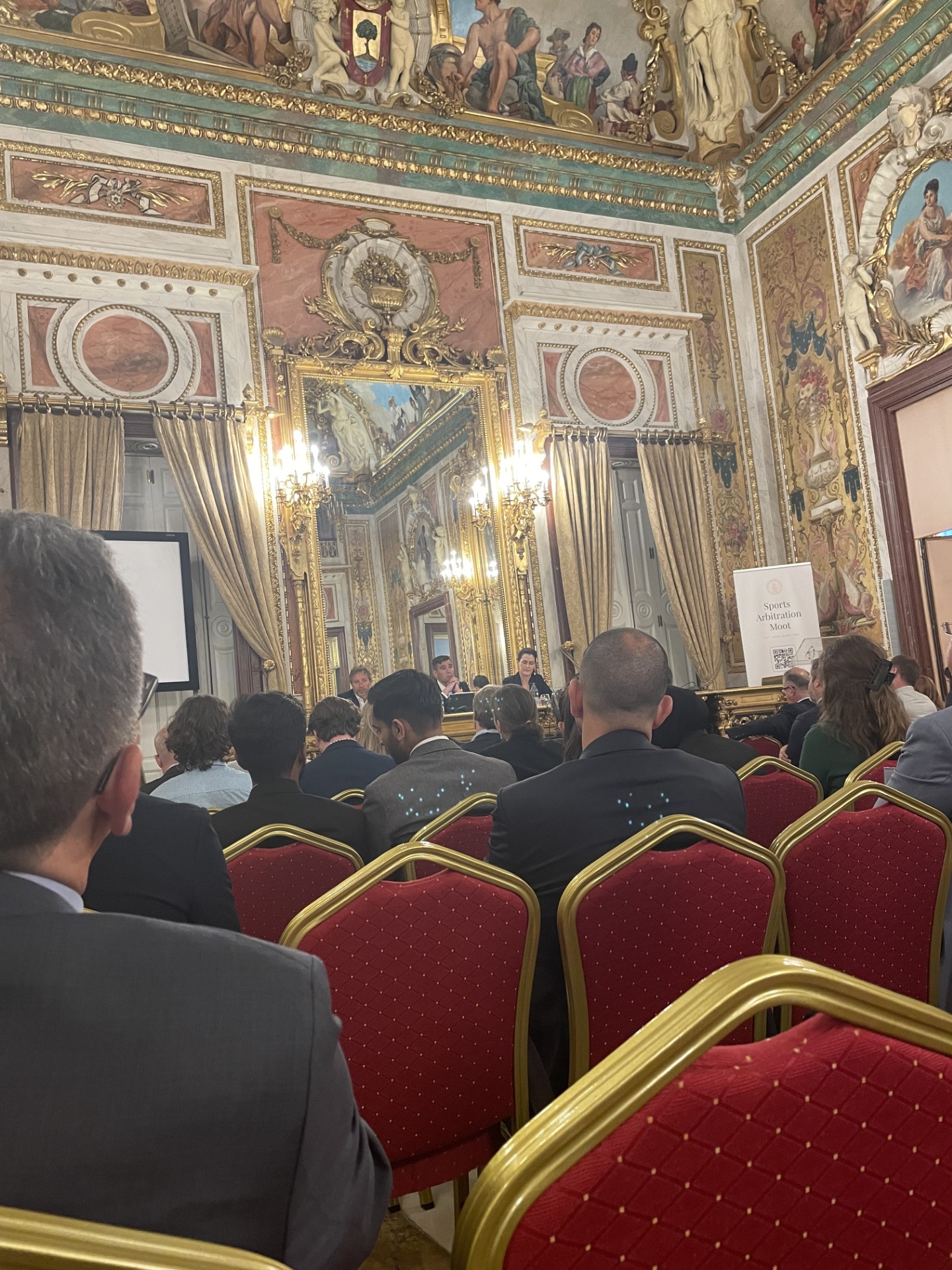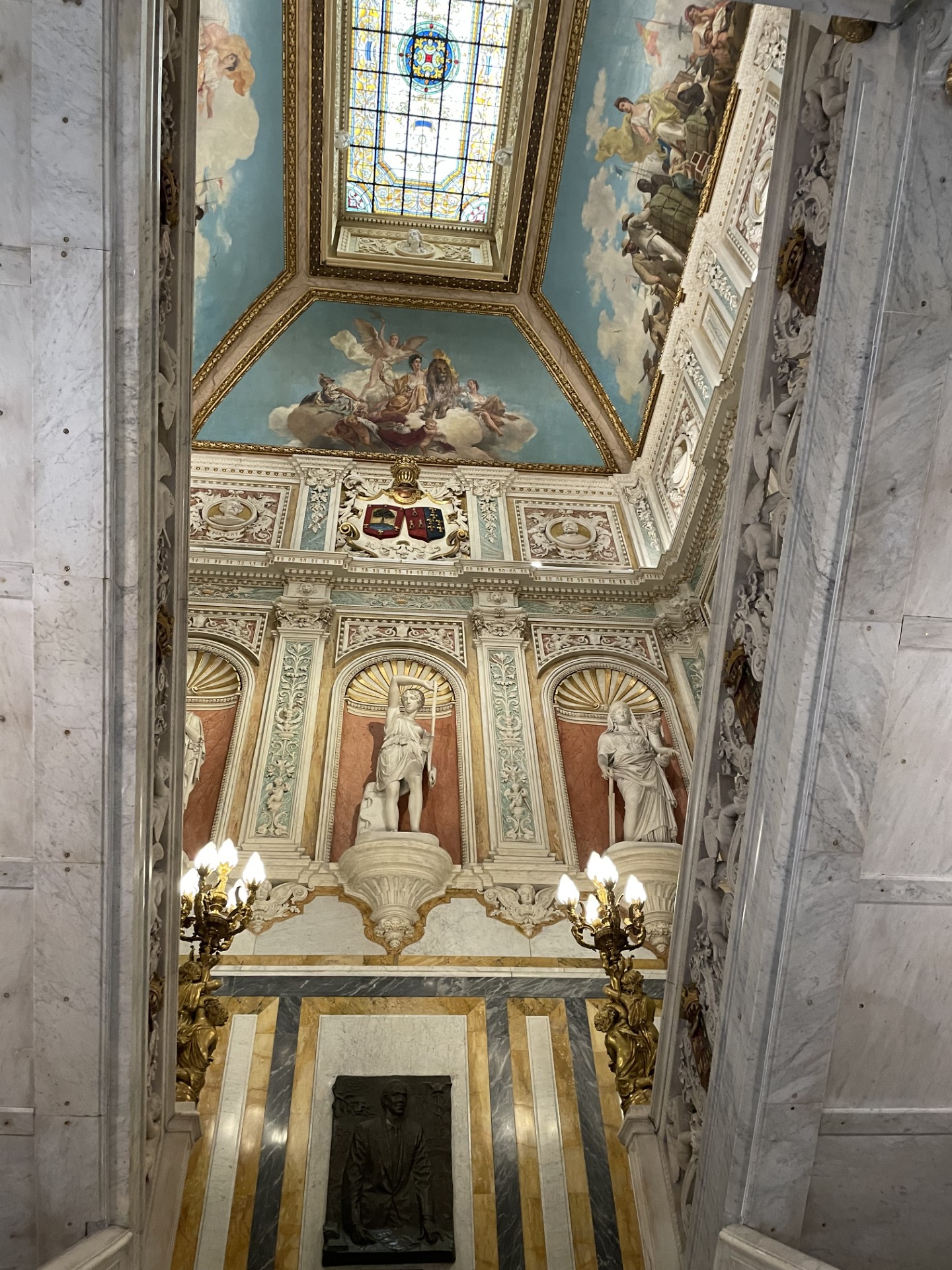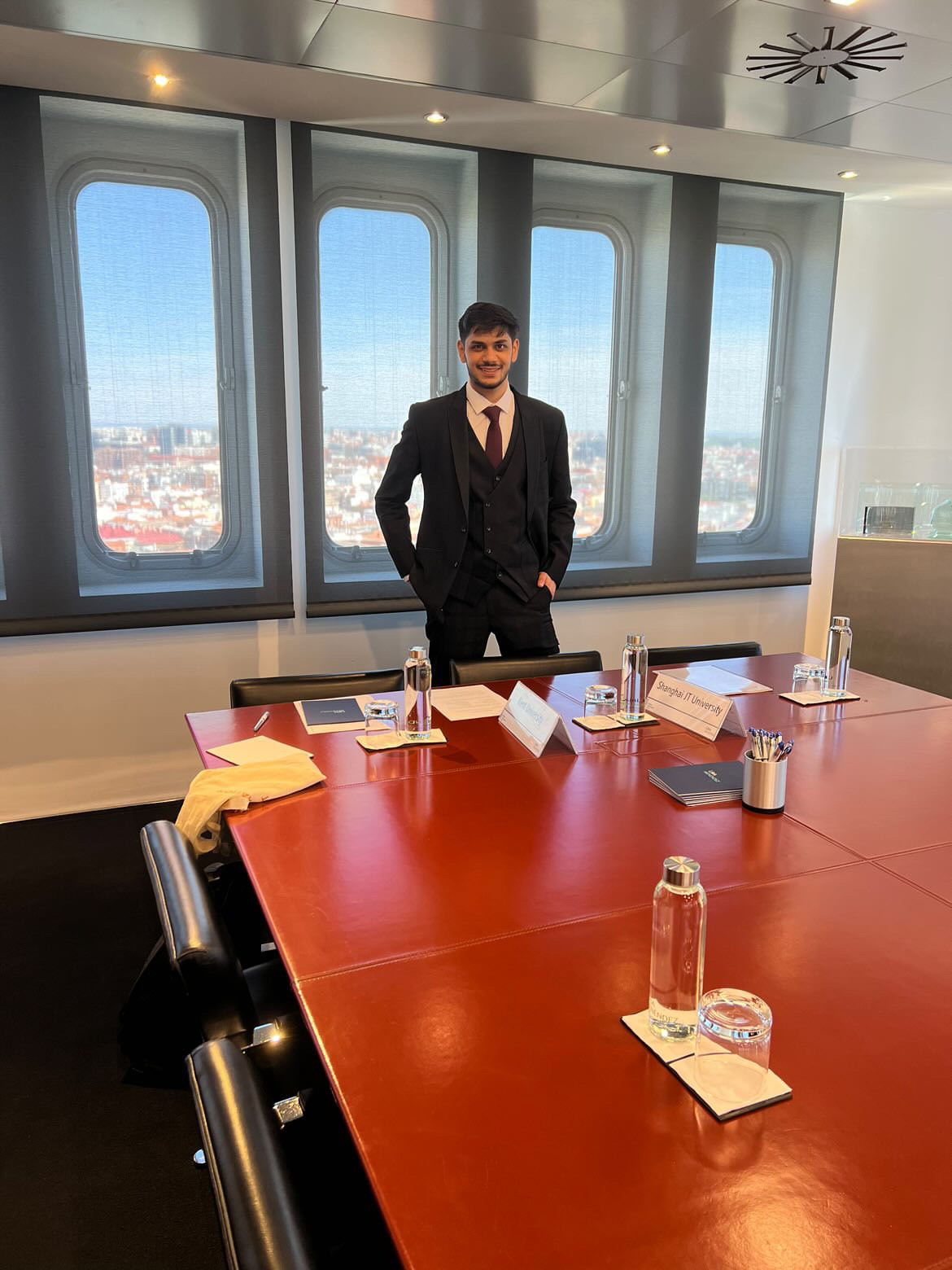“Now go and bring home the silverware to KLS!!!!”
– Trevor Linn, Full-time Lecturer of Law and Part-time Rugby Coach.
With those words of encouragement ringing in our ears, the University of Kent team, comprising Claudia Laforty, a final-year LLB student from Canada (soon to graduate with first class honours) and myself, set off for the Sports Arbitration Moot in Madrid, determined to do just that – bring home the silverware. My name is Moksh Gadia, a final-year LLB student from India (soon to graduate with first class honours), and here is the story of my once-in-a-lifetime experience of winning at the Sports Arbitration Moot 2024.
The Build Up
When I first approached Darren Weir, the Director of Lawyering Skills at Kent Law School, I was filled with a mix of eagerness and uncertainty. My ambition to become a barrister was clear, but the path was still unfolding. Darren, with his characteristic warmth and wisdom, listened patiently as I expressed my desire to engage in extracurricular moots. With a thoughtful nod, he introduced me to the idea of participating in the Sports Arbitration Moot 2024. It was an unfamiliar territory for me, and my initial reaction was one of hesitation. Yet, Darren’s unwavering belief in my potential was compelling. He suggested I partner with Claudia Laforty, a fellow student whose passion for sports law was well-known. Despite my reservations about stepping into the unknown world of sports law, the opportunity felt too significant to pass up. Little did I know, this would mark the beginning of a transformative journey.
A Sports Arbitration Moot is a simulated legal competition where participants engage in the arbitration process, specifically within the context of sports-related disputes. Unlike traditional court cases, arbitration is a form of alternative dispute resolution where an arbitrator, acting as a neutral third party, renders a binding decision. The moot typically involves complex scenarios such as contract disputes, doping allegations, and governance issues within sports organizations. Participants must demonstrate a deep understanding of both legal principles and the specific regulations governing sports. This requires extensive research, strategic thinking, and persuasive advocacy, as teams argue their cases before panels of experienced arbitrators, mimicking real-life sports arbitration proceedings
The Sports Arbitration Moot was structured to include several stages, beginning with online preliminary rounds and culminating in an in-person final round. Initially, 72 registered teams from universities across the globe participate in three online rounds. From these rounds, the top 16 teams are selected to advance to the offline rounds in Madrid. In Madrid, these teams compete in a series of knock-out rounds, leading up to the final match where the overall winner is determined.
The Case – “Painkillers in Evening Tea”
The case scenario crafted by the organizers revolved around a fictitious young footballer named Leslie Young from Irodinia. Young had consumed his evening tea in a cup that had been contaminated with Tramadol, a banned substance. Young had been found guilty of Anti-Doping Rule Violations by the FIFA Disciplinary Committee. However, due to the inadvertent nature of his substance consumption, the committee chose not to sanction him. The scenario further unfolded with the World Anti-Doping Agency appealing this decision to the Court of Arbitration for Sport, setting the stage for a complex and challenging moot.
The Online Rounds – “The First Wins”
The online rounds were a whirlwind of preparation and intense debate. Claudia and I spent countless hours researching, drafting, and rehearsing our arguments. Each round presented a new challenge, with complex legal questions and tough scrutiny from the judges. Despite the pressure, we remained focused and determined. In these rounds, we found ourselves up against three formidable universities: Thomas Jefferson Law School (USA), Ain Shams University (Egypt), and San Pablo CEU (Spain). Each team brought its own unique flair to the competition, with distinct lines of reasoning and advocacy styles that challenged us to our core.
Facing Thomas Jefferson, we encountered a team with a sharp, analytical approach, dissecting every nuance of the case with precision. Ain Shams, on the other hand, impressed us with their passionate and eloquent arguments, weaving compelling narratives that resonated deeply. Then there was San Pablo CEU, who surprised us with their out-of-the-box arguments, presenting innovative and unconventional perspectives that tested our ability to think quickly and adapt. We had to be quick on our feet, relying on our extensive research and preparation to withstand each argument made against us. After every round, the arbitrators provided invaluable feedback, which we diligently implemented in our strategy for the next match. This iterative process of learning and improving not only honed our skills but also strengthened our resilience and adaptability.
The pressure was immense, but each challenge pushed us to sharpen our abilities and deepen our understanding of sports law. With every round, our confidence grew, and our partnership strengthened. After the intense online rounds concluded, we anxiously awaited the announcement of the results. With only 16 out of 72 teams making the cut, the tension was palpable. Claudia and I could hardly sit still, our nerves stretched to their limits.
Finally, the moment arrived. The results were announced, and with them came our tickets to Madrid. To our immense relief and excitement, we had placed 8th overall in the online rounds, comfortably securing our spot in the top 16. As if this news wasn’t thrilling enough, we discovered that we were the only UK university to qualify. The realization hit us like a tidal wave. We were not just going to Madrid; we were representing the entire United Kingdom on this prestigious international stage.
Road to Madrid – “From Kent, with Love”
The university truly excelled during this entire journey. I have friends studying at Oxbridge and other Russell Group universities, but I can proudly say I belong to Kent. This experience reaffirmed that Kent is an exemplary institution in every way. From the moment we qualified, the university stepped in to ensure everything went seamlessly. They managed our flight bookings, hotel reservations, and even arranged our train to Heathrow. Every logistical detail was meticulously handled, allowing us to focus entirely on our preparation.
A particular challenge arose when Darren Weir discovered that I needed a visa to travel to Madrid, and the cost was prohibitively high. Without hesitation, Kent provided me with the Hardship Fund, a resource specifically designed for such scenarios. This generous support covered all my visa expenses, ensuring I could make the trip without any financial strain. Kent’s unwavering support filled me with immense pride for my university. They went above and beyond to ensure we had every opportunity to succeed, proving once again that they are an exceptional institution dedicated to their students’ success.
Round of 16 – “The Challenge from Home”
Upon reaching Madrid, we discovered that we had drawn NLSIU Bangalore in the elimination round. For some context, this is the best law school in India, and as an Indian, I had a solid understanding of its prestige and the capabilities of its students. This is India’s Oxbridge. A quick LinkedIn search on their team confirmed why they were representing the best Indian institution. The nerves got to me, and I began to doubt myself greatly. This is when Trevor sent me the message mentioned in the heading. It was funny when I first read it, but it was somehow very reaffirming. It reinforced the faith our professors had in us, boosted my confidence, and reminded me that we had earned our place here through our talent and hard work. No one could take that away from us.
The Indian team was spectacular, as expected, displaying impeccable legal knowledge and advocacy skills. The contest between us was so evenly matched that the judges, in their own words, had to hold a round of judicial intervention to determine the winner. This was where our preparation and experience truly paid off. The skills I had gained through the Mooting module at Kent proved pivotal. I had learned that not every legal argument needs to be “won” and that conceding a few points strategically can help win the appeal. This understanding allowed us to be extremely manoeuvrable with our alternative submissions. In the end, the judges declared us as the team advancing after a very hard-fought, even contest. With that, we advanced to the Quarter-Finals.
Quarter-Finals- “David vs Goliath”
 As we moved into the quarter-finals, our excitement quickly evaporated when we saw the team we had drawn for this round: Shanghai JTU (China). This formidable team had placed first overall in the qualification rounds and had just triumphed over the second-ranked team from Carlos III (Spain). They were the talk of the town, and everyone, including us, dreaded the prospect of facing them. A cursory reading of their skeleton arguments quickly revealed why they were the best-ranked and most feared team in the competition.
As we moved into the quarter-finals, our excitement quickly evaporated when we saw the team we had drawn for this round: Shanghai JTU (China). This formidable team had placed first overall in the qualification rounds and had just triumphed over the second-ranked team from Carlos III (Spain). They were the talk of the town, and everyone, including us, dreaded the prospect of facing them. A cursory reading of their skeleton arguments quickly revealed why they were the best-ranked and most feared team in the competition.
The hearing took place in a grand conference suite with a long table. We faced eight seats occupied by the largest team in the competition, consisting of researchers, backup speakers, and a coach. In stark contrast, they faced the smallest team in the competition: just the two of us, serving as researchers, backup speakers, and coaches all in one.
At this point, we had somewhat resigned ourselves to the idea that this would likely be the end of our journey. We relaxed, feeling there was no point in being nervous anymore. In hindsight, this attitude had an unexpectedly positive effect. Instead of making us anxious, it put us in a state of nonchalant fearlessness. We became confident in our advocacy, presenting our arguments with force and conviction. Our newfound vigour not only took the organizers and judges by surprise but also caught the opposing team off guard. We challenged their points assertively and navigated the complex legal terrain with a clarity and determination we hadn’t experienced before.
When the results were announced, we were absolutely shell-shocked. We had achieved the unimaginable. We had emerged victorious. We were now among the top four teams in the world. This sensational triumph was a testament to our hard work, adaptability, and fearless approach, marking a defining moment in our mooting journey.
Semi-Finals- “Wounded but not broken”
 The day of the semi-finals was a spectacle of high anticipation, with only four teams remaining from the initial 72. The event was set in the majestic halls of the Corte de Arbitraje, or Court of Arbitration, a venue befitting the occasion’s gravitas. However, the grandeur of the setting quickly paled in comparison to the personal battles we faced. I woke up with a fever of 102 degrees, while Claudia was grappling with a severe flu. We struggled physically and mentally just to rise from our beds.
The day of the semi-finals was a spectacle of high anticipation, with only four teams remaining from the initial 72. The event was set in the majestic halls of the Corte de Arbitraje, or Court of Arbitration, a venue befitting the occasion’s gravitas. However, the grandeur of the setting quickly paled in comparison to the personal battles we faced. I woke up with a fever of 102 degrees, while Claudia was grappling with a severe flu. We struggled physically and mentally just to rise from our beds.
Yet, surrender was not an option. With a few paracetamols and fervent pep talks, we gathered our strength and resolved to take on the University of Wuhan (China). The match was fiercely contested, with both teams evenly matched in skill and determination. My physical ability to speak was pushed to its limit, and the quality of my delivery waned as time progressed. The judges challenged us with relentless judicial interventions, and our opponents were equally formidable in their arguments.
In the end, the judges announced that the point difference came down to a single point—a single point that would determine who advanced to the finals. Unfortunately, that point was not in our favour and was awarded to Wuhan, marking the end of our journey. Despite the outcome, we held our heads high, proud of the valiant effort we had put forth under such trying circumstances. We concluded the Moot ranked 3rd overall in the world! What a wonderful feeling to have!
Grateful Reflections
At the end of the day, I am filled with nothing but happiness as I reflect on this incredible opportunity. I extend my deepest gratitude to the University, the LSSJ Support Staff, and Darren Weir for their unwavering support. I am also profoundly grateful to have had a partner like Claudia Laforty, a hardworking, smart, and talented individual. And last but not least, a special thanks to Trevor Linn—Kent can proudly claim the silverware.
I highly recommend any law students out there to seek mooting experience in various competitions and to consider sports law as a potential future practice area.

